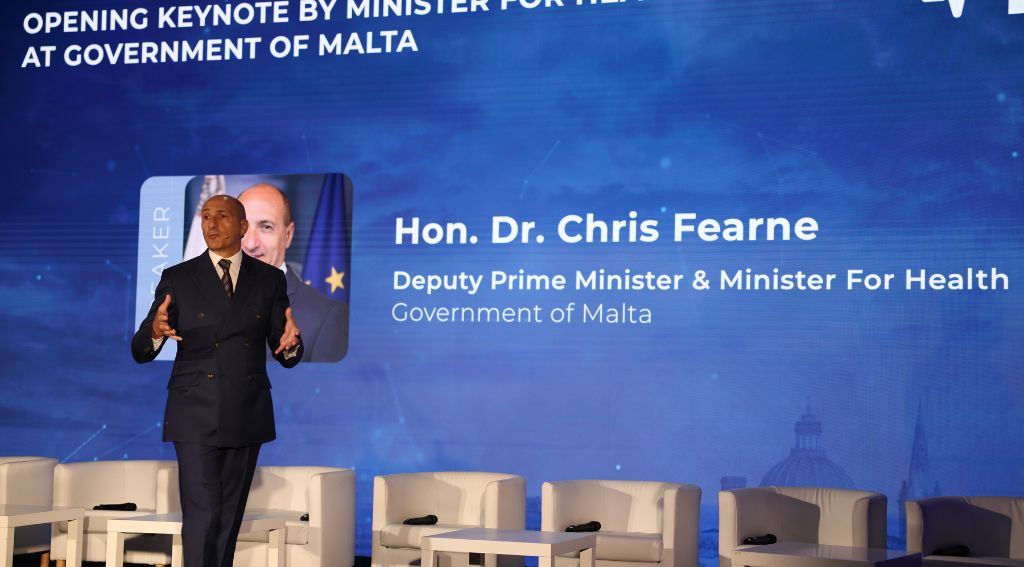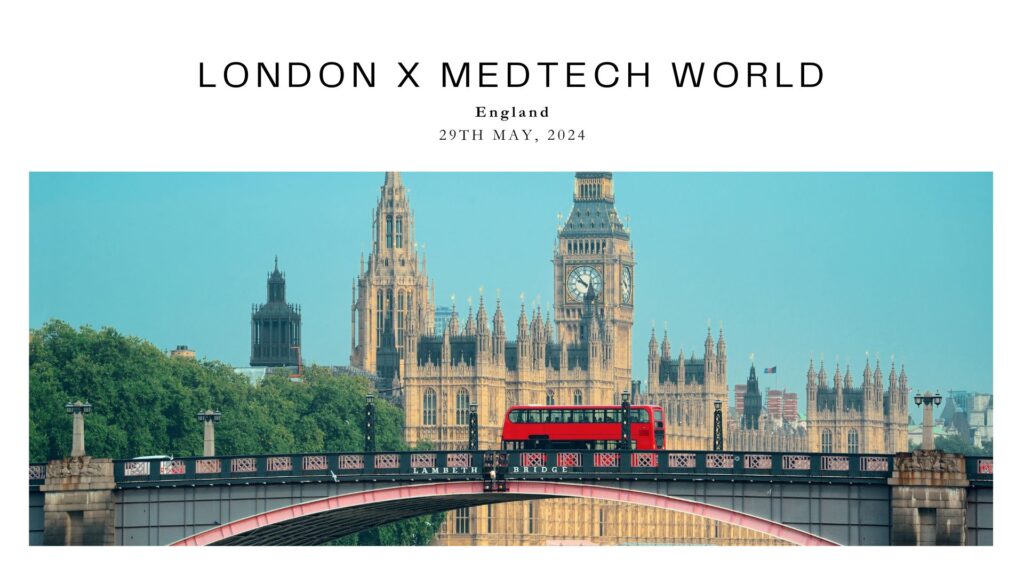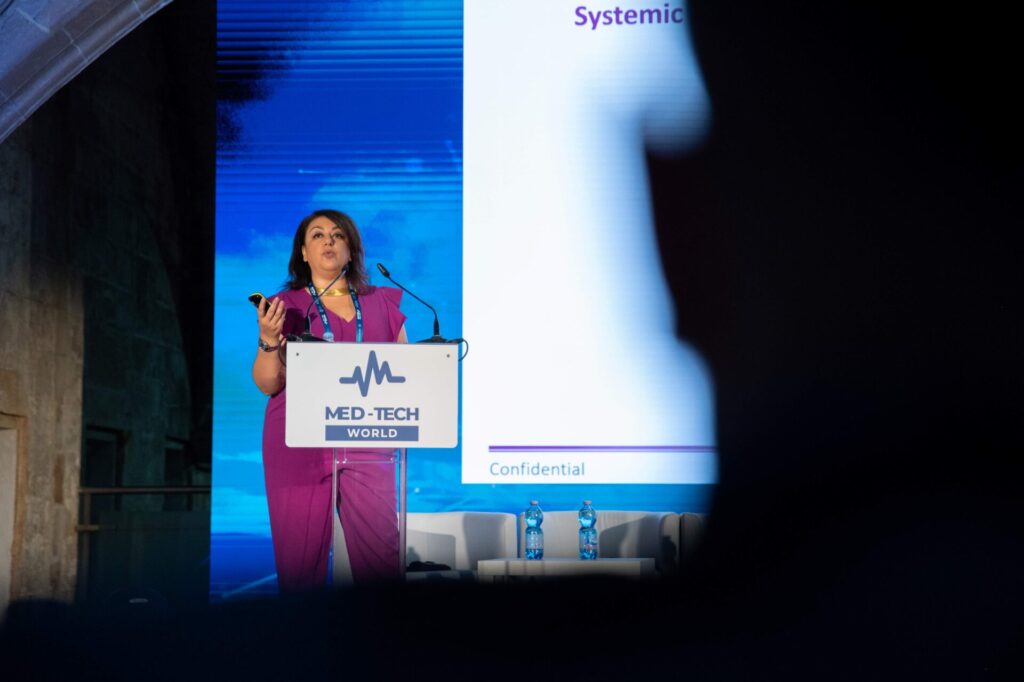
Michael Joe Cini
19th October 2023
Building Malta’s Med-Tech hub – keynote by Dr Chris Fearne, Deputy Prime Minister and Minister for health
At the Malta Med-Tech World Summit which took place at the Mediterranean Conference Centre in Valletta, Malta, the Minister of Health and Deputy Prime Minister of Malta, Dr. Chris Fearne, delivered a keynote and began with the insightful notion that “Necessity is the mother of invention, but necessity is also the mother of opportunity.”
In the limited time available for this presentation, Dr. Fearne spoke about the global challenges within the medical field and the pivotal role of technology.
He said that most stakeholders regard technology as a modern-day saviour of the medical field. Dr. Fearne, however, acknowledged the vast complexity of climate change, a formidable challenge with undeniable repercussions in healthcare.
In this address, Dr Fearne focussed on four key challenges currently at the forefront.
Access to medicines
Access to medicines is a worldwide challenge of paramount importance. Irrespective of the quality of available medicines, their efficacy remains futile unless they are accessible to patients. Patients not only need these medicines but also require comprehensive information about their usage.
This entails knowledge of ingredients, potential interactions with other medications, contraindications, side effects, and safety during pregnancy, all of which necessitate clear and comprehensible packaging and patient information leaflets. An impediment arises when these materials are provided in languages incomprehensible to the patients, particularly in regions like Europe where importing or using non-European Union approved medicines is prohibited.
The unique languages in certain countries compounds the issue, limiting the sources of medicines to a select few. A feasible solution emerges on two fronts: manufacturers’ reluctance to print information in various languages due to cost considerations and the development of an “Electronic Patient Information Leaflet” (EPIL). Malta is currently spearheading this initiative in collaboration with the European Commission’s Agency, enabling the scanning of barcodes on smartphones to access medicine information in one’s native language. This groundbreaking innovation, notably piloted in Malta, allows patients to decipher leaflets in Maltese or English.
This digital transformation represents an opportunity for innovation, permitting patients across the European Union to access medicine information without language barriers, thereby alleviating a significant challenge in the medical sector.
Demand and supply of medical and health workers
While the medical field has seen an unprecedented surge in the number of professionals, the demand for these services consistently outpaces the supply. This scarcity is not confined to specific regions but extends across Europe and North America.
As a temporary fix, many countries have resorted to importing nurses and doctors from middle and lower-income nations, effectively addressing their domestic shortages but exacerbating the issues in the source countries. Dr. Fearne, in his role as President of the World Health Assembly, expressed reservations about this approach. Herein lies an opportunity for technology to intervene. In Malta, electronic patient records and remote patient monitoring are utilized, emphasizing prevention over cure and entrusting patients with greater responsibility for their well-being. This approach aims to augment the medical workforce or reduce the demand for healthcare services by operating more efficiently. This is where artificial intelligence plays a pivotal role, capable of substituting professionals in fields like radiology, ophthalmology, and dermatology. Telemedicine, a vital component, gained prominence during the COVID-19 pandemic.
Dr. Fearne underscored the necessity of integrating technology into the curricula of medical schools, ensuring that doctors and pharmacists become proficient in technological advancements. The integration of drones for the delivery of medicines to remote areas with a shortage of pharmacists or limited pharmacy access represents another aspect where technology can alleviate a significant challenge.
Dr. Chris Fearne shed more light on the critical challenges and opportunities within the medical field, highlightingvthe transformative role of technology in mitigating the challenges of the supply of health professionals
Antimicrobial resistance
Dr. Fearne’s address at the Malta Med-Tech World Summit expanded on the pressing issue of antimicrobial resistance and the gravity of the situation. He articulated that the medical community is increasingly confronted with the shortage of antibiotics painting a stark picture of our current reality. Alarmingly, one in five infections is now categorized as untreatable, a statistic that threatens the very core of modern medicine.
Dr. Fearne stressed that we are essentially racing against time. He forewarned that if we do not take immediate action, we will find ourselves in a dire situation within the next seven to ten years. Urgent innovation is needed to develop new diagnostics and devise effective strategies for the prudent use of antibiotics. This innovation must extend to animal husbandry and environmental practices, as the overuse of antibiotics in these sectors contributes significantly to the crisis.
The critical message he conveyed was the necessity of finding an alternative to antibiotics, as overreliance on them is no longer a sustainable path. This is where technology comes into play. The world finds itself in an urgent predicament, one that mandates immediate attention and innovative solutions. In a testament to Malta’s commitment to tackling this challenge, Dr. Fearne announced that Malta has been appointed to facilitate efforts in this regard.
As a facilitator, Malta will work diligently to bring forth innovative ideas and solutions. Dr. Fearne championed the need for “smart working” to address the issue of antimicrobial resistance effectively. This pressing matter demands a concerted effort from the global community, with innovation and technology as our foremost allies in the battle against “micro resistance.” The urgency and gravity of the situation underscore the indispensable role of innovation and technology in safeguarding the future of medicine and public health.
Most rare diseases are uncurable
In his concluding remarks, Dr. Fearne turned his attention to the profound challenges posed by rare diseases, recognizing that the majority of these conditions remain incurable. Rare diseases are uniquely defined by their scarcity, with an incidence of just one case in every 10,000 individuals. The complexity of this issue becomes apparent when considering the vast number of rare diseases that exist, collectively affecting approximately 6 percent of the global population.
What compounds the challenge is that over 90 percent of these rare diseases currently lack effective cures. Clinical research in this domain is exceptionally challenging due to the limited number of individuals afflicted by each specific rare disease, making it difficult to conduct meaningful trials and develop tailored treatments.
Dr. Fearne advocated for the establishment of a comprehensive platform that could unite individuals affected by rare diseases from across the world. This platform, equipped with the power of quantum computing, could revolutionize medical research by expediting the testing of potential treatments, thereby offering newfound hope to those who face rare diseases.
He highlighted the significant potential of genetic testing, exemplified by innovations like “genomus,” which empowers medical professionals to determine a patient’s response to specific medications, ultimately facilitating personalized treatment plans.
In closing, Dr. Fearne revisited the overarching challenge of climate change, stressing the urgency of addressing this global crisis. He reminded the audience, “Finally to close, I will go back to climate change,” emphasizing, “we are the first generation to experience climate change, but we are the last generation to stop it. Let us not waste this opportunity.” His concluding words resonated as a call to action, urging everyone to seize the moment and take meaningful steps to mitigate the environmental challenges that imperil our planet.
Dr Chris Fearne is Deputy Prime Minister of Malta and Minister for Health. He is President of the World Health Assembly. He was speaking at Malta Med-Tech World Summit.
Related topics:






